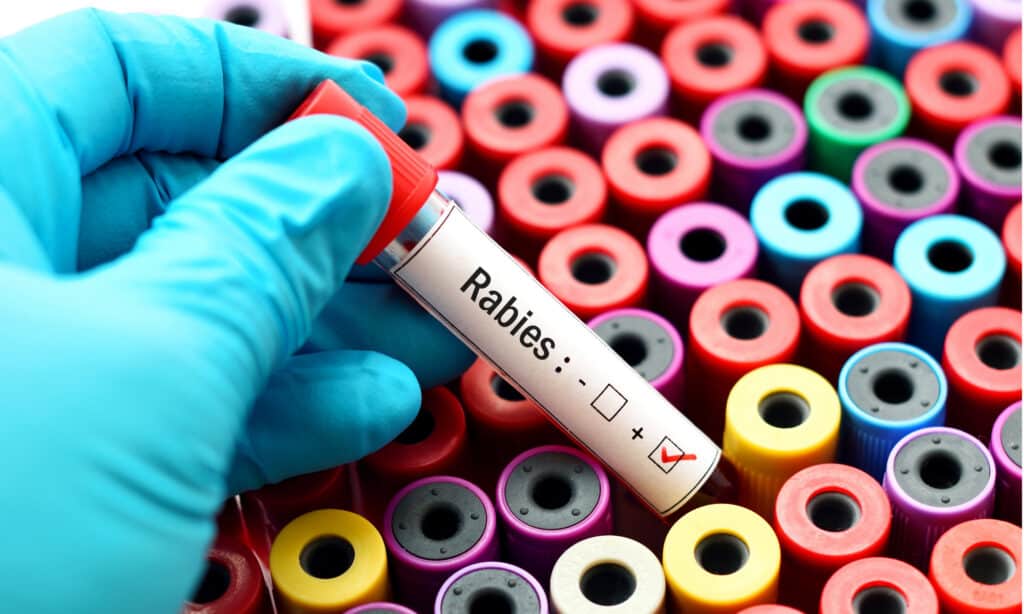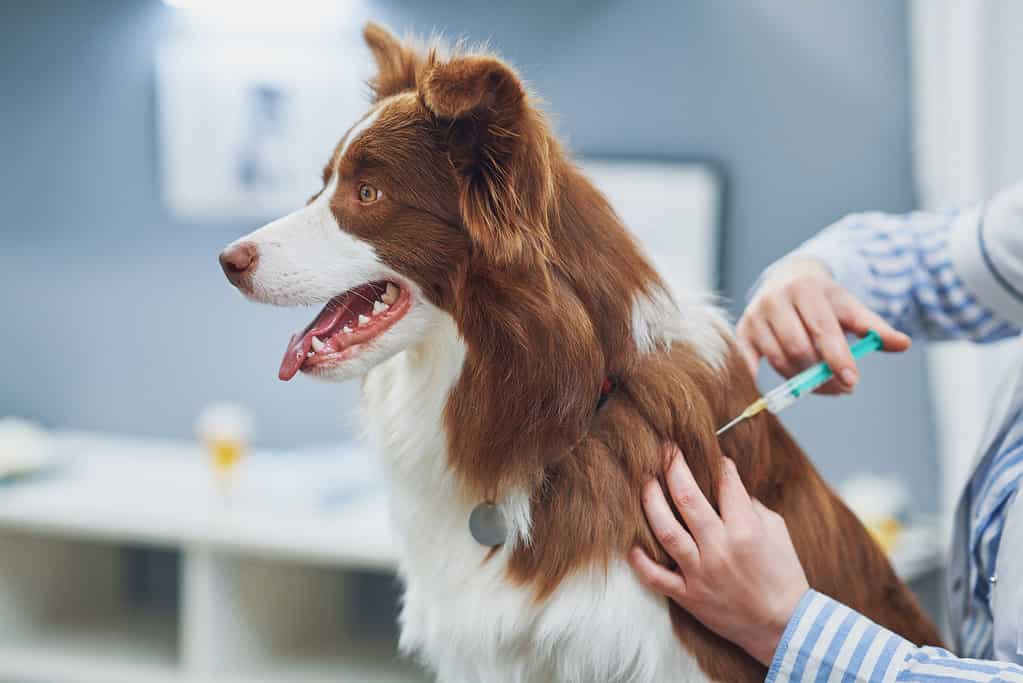Puppies need so many vaccines, it can get confusing! It can even be overwhelming when your vet discusses vaccine options for your adult dog.
The four core vaccines for dogs are rabies, parvovirus, distemper, and hepatitis. Veterinarians recommend all dogs be up to date on these. Non-core vaccines may be recommended depending on your dog’s risk level and include bordetella, leptospirosis, canine influenza, coronavirus, and lyme disease.
In this article, we’ll talk about the vaccines available for your dog, the severity of the illnesses they protect against, and which dogs they’re recommended for. Of course, you should always speak to your veterinarian and follow their guidance when it comes to your dog’s health.

Core vaccines are recommended by veterinarians for all dogs to help protect them from illnesses they are most at risk of developing.
©iStock.com/shironosov
Core Vaccines
Core vaccines are recommended by veterinarians for all dogs, as it’s been determined that all dogs are at risk of developing these illnesses.
The four core vaccines for dogs are:
Rabies
Rabies vaccination is required by law in most states in the U.S. Therefore, it’s not an option for pet owners or veterinarians–your dog must be vaccinated either yearly or every three years.
This is because rabies has an extremely high mortality rate of essentially 100%.
In addition, rabies is contagious and can be transferred to other animals and humans who come into contact with an infected animals’ saliva. This is typically through bite or scratch wounds, but can also be from infected saliva reaching the eyes, mouth, or wounds in the skin.
Luckily, the vaccination is very effective at preventing rabies and almost ensures that your dog will not catch it.

Rabies vaccination is required by law in most states in the U.S.
©iStock.com/arun011
Parvovirus
Canine parvovirus, or parvo, is a gastrointestinal disease that is spread through feces and the environment. It can survive in a dog’s environment for long periods of time and is most commonly spread in crowded environments like shelters, boarding facilities, and other public spaces.
Infected dogs should be isolated to prevent spread, as parvo is highly contagious. It’s most dangerous to puppies and unvaccinated dogs, and some will die even with the best veterinary treatment.
Parvo vaccines are typically given at six, eight, 12, and 16 weeks of age. They are then given again a year later, and once every three years after that.

Canine parvovirus, or parvo, is a highly contagious gastrointestinal disease that is spread through feces and the environment.
©Todorean-Gabriel/Shutterstock.com
Distemper
Canine distemper affects a dog’s respiratory, gastrointestinal, and central nervous systems. It also impacts several organs and is incurable.
Distemper can be spread by close proximity to an infected animal or through contaminated surfaces in a dog’s environment. It is highly contagious.
Puppies should be vaccinated at 8, 12, and 16 weeks of age. After this, most veterinarians recommend a booster every 1-3 years.
Hepatitis
Canine hepatitis, or adenovirus, affects various organs and is often deadly. Dogs can develop either acute or chronic hepatitis, with the former developing over days and the latter taking place over a few weeks or more.
Acute hepatitis is sometimes curable, while chronic hepatitis is incurable. Hepatitis can cause long term illness even in dogs who have recovered, including kidney damage which is irreversible.
Hepatitis is spread through infected fluid from a sick animal. This can include saliva, nasal discharge, urine, and feces. Dogs who survive hepatitis continue to carry the disease for six months or longer.
Vaccines are typically given at seven to nine weeks, 11 to 13 weeks, and 15 months of age. Dogs should then get a booster every year.
What is the DHPP Vaccine?
The DHPP vaccine in dogs protects against distemper, hepatitis, parainfluenza, and parvovirus. We discuss all of these separately in this article, but the joint vaccine is used so that dogs don’t need to get four separate shots.

The DHPP vaccine in dogs protects against distemper, hepatitis, parainfluenza, and parvovirus.
©iStock.com/macniak
Non-Core Vaccines
Non-core vaccines can still be incredibly important, and are given to dogs based on their risk of exposure to the disease.
It’s best to ask your veterinarian which vaccines they recommend based on your area and your dog’s lifestyle. Of course, you can also do research for yourself and bring specific vaccines up to your vet to see what they think.
Here are the non-core vaccines for dogs:
Bordetella Bronchiseptica
Bordetella is the most common cause of kennel cough. It’s recommended for dogs who are often around others at doggy daycare, dog parks, or other social settings.
If your dog participates in an activity involving other dogs or visits places where other dogs frequent, such as the groomer, they’ll likely be required to get the vaccine in order to enter. This keeps everyone safe, including both your dog and other pups at the facility.
Kennel cough can turn into bronchopneumonia, which when serious can lead to death.
Puppies should get the vaccine at six to eight weeks and again at 10 to 12 weeks. Adult dogs should be vaccinated once every six to 12 months.

Bordetella is the most common cause of kennel cough.
©Dhanoo Surasarang/Shutterstock.com
Leptospirosis
Leptospirosis symptoms and severity range in dogs from those who are asymptomatic to those who die of the disease. It can also be spread to humans.
Risk factors that increase a dog’s chances of catching leptospirosis include spending time in or drinking from bodies of water outdoors, on rural properties, or around farm animals, rodents, dogs, or wildlife.
Leptospirosis is spread through infected fluids entering the mucous membranes (such as the eyes, nose, and mouth) or open cuts or wounds. It can also be spread through breeding, though this is rare, or passed to unborn puppies through their mother.
Vaccinations can be given as soon as eight to twelve weeks of age. Your dog will need two doses two to four weeks apart, then a yearly booster.
Canine Influenza
Canine influenza is another of the many viruses that can cause kennel cough. As we discussed before, kennel cough is usually a mild disease but can cause bronchopneumonia which may be more serious.
This vaccine is most important for dogs who spend lots of time around other dogs or who visit public places often, such as the dog park, groomer, or daycare.
To be considered fully vaccinated, and thus at the lowest risk possible, dogs should receive two doses two to four weeks apart and then a yearly booster.
Like humans, dogs can get different strains of flu. Currently there are vaccines for the H3N8 and H3N2 strands and also a bivalent vaccine that protects from both.

The canine influenza vaccine is most important for dogs who often spend time around other dogs such as in dog daycare.
©iStock.com/Hero Images
Coronavirus
The coronavirus dogs are vaccinated against is not the same as COVID-19. Instead, it’s a separate strain that cannot be spread to humans.
This vaccine is recommended to dogs who spend time in crowded places with other dogs or who live in multi-dog households. Dogs can catch coronavirus from infected saliva or feces, so spending time outdoors is also a risk factor.
The disease causes stomach upset and typically goes away in a matter of days, but sometimes administration of fluids is needed. Dogs can also develop secondary infections.
Dogs can be carriers for coronavirus for up to six months and it can survive for a long time in their feces.
Lyme Disease
Lyme disease is caused by a bacteria carried by ticks. A dog becomes infected after being bit by a blacklegged tick.
The bacteria enters a dog’s bloodstream where it can travel to organs, joints, and all throughout the body causing widespread illness.
Dogs who spend a lot of time outdoors, especially in tick-infested spaces like wooded areas or tall grass, are most at-risk.
In severe cases, Lyme disease can be fatal. Lyme disease is not contagious, though other dogs or humans who’ve been around the dog should be checked for ticks since they may also be at increased risk due to environmental factors.
Vaccines are typically given in two doses three weeks apart, then once a year.

A dog can become infected with Lyme disease after being bitten by a blacklegged tick.
©iStock.com/Ladislav Kubeš
Rattlesnake Vaccine (Crotalus Atrox Toxoid)
The rattlesnake vaccine is given to dogs who are at increased risk of being bitten by rattlesnakes as a preventative measure.
Rattlesnake bites are 25 times more dangerous to dogs than humans, and even dogs who survive can develop permanent disabilities.
The vaccine is typically given first in two doses 30 days apart, then every six months to a year depending on the dog’s risk level.
That completes the list of important dog vaccines to consider for your pooch. Remember to always speak to your veterinarian about your dog’s risk level, their health, and whether they recommend a vaccine.
The photo featured at the top of this post is © FamVeld/Shutterstock.com
Ready to discover the top 10 cutest dog breeds in the entire world?
How about the fastest dogs, the largest dogs and those that are -- quite frankly -- just the kindest dogs on the planet? Each day, AZ Animals sends out lists just like this to our thousands of email subscribers. And the best part? It's FREE. Join today by entering your email below.
Thank you for reading! Have some feedback for us? Contact the AZ Animals editorial team.






